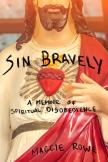'Sin Bravely' inadvertently shows the value of a good spiritual director
Sin Bravely, by Maggie Rowe, is a memoir about a young evangelical Christian in desperate need of a good spiritual director. The narrator and heroine is an aspiring actress who cannot be sure she has been saved, even though she has accepted Jesus as her personal savior not once, but many, many times. Hers is a spiritual journey in reverse, one that starts from a position of belief but then slowly seems to back away from it.
The catchy title comes from Martin Luther: “Sin bravely so that you may know the forgiveness of God.” The subtitle is tailored to our times: “A memoir of spiritual disobedience.” The author is a comedian and screenwriter living in Los Angeles looking back at her formative years. As a young girl, Rowe is thoughtful and precocious. She knows her Bible and is intent on doing the right thing. But despite her best efforts, she cannot decide what constitutes a sin. In college, she tries cursing, and then sleeping with her boyfriend, but her casual sinning leads to a nervous breakdown. She lands in a Christian psychiatric facility, where she is eventually diagnosed with “scrupulosity” and, after some resistance, agrees to take antidepressants.
It takes time for Rowe to find a trusted counselor. His advice sets her on an unexpected course, to “sin bravely,” that would not be out of place in a Graham Greene novel. But her insights, while hard won, can seem like weak tea. “What if I didn’t have to worry about the Bible?” she asks herself. “What if I could just trust my instincts, my innate sense of good and bad?” Rowe is a winning narrator, and you can’t help but root for her. But this reader was left wondering whether a different kind of religious education, one that respected Maggie’s intelligence but also emphasized community and tradition, would have set her on a different path.
This article also appeared in print, under the headline “An evangelical pilgrimage in reverse,” in the January 23, 2017, issue.









